TAM 2014: the mind of the science denier
It’s been just over a week since I returned, exhausted but inspired and excited, from The Amaz!ng Meeting 2014 in the South Point Hotel south of Las Vegas. The meeting was a great success, with nearly 1200 attendees, and an excellent slate of speakers including Bill Nye the Science Guy (who talked about his debate with Ken Ham and gave me a nice shout-out for helping him), Genie Scott, Daniel Dennett, Michael Shermer, and many others. This year, the theme was “Skepticism and the Brain,” so the speakers including a lot of the leading lights of psychology and neurophysiology, including Elizabeth Loftus (who has shown that human memory is highly unreliable, and usually false), Robert Kurzban (talking about the modular mind), Carol Tavris (talking about cognitive dissonance), and many others. My friend and co-author Daniel Loxton gave an amazing talk about skepticism and why it’s important (it got rave reviews and a standing ovation). Many of the participants thought that this was one of the best TAMs ever, because it largely stuck to a consistent theme, rather than giving a scattershot slate of speakers on widely divergent topics. Plus there were the usual wild evening activities, including another installment of Penn Jillette’s inimitable Rock’n’Roll, Doughnut and Bacon party.
I’ve done several panels and workshops at TAM before, but this was my first turn as a featured speaker. To echo the theme of the meeting, I talked about “The Mind of the Science Denier”. I was scheduled for the last Sunday against the final of the World Cup, but I still got a great turnout. Since most of the major themes of human psychology had already been mentioned before me, I used my position as last speaker to summarize those ideas, and build upon them in the context of my topic, science denialism. The full details and sources for the talk are in the final chapter of my new book, “Reality Check”, but I’ll briefly summarize the main points here, since a bunch of people who missed it asked me to do so. Hopefully, the JREF will have the video of the entire conference on line at some point, so the interested public can view the whole conference.
I began with the story of the French Enlightenment, and how scholars and philosophers of that time thought that reason and science were finally beginning to vanquish religion and superstition. The Marquis de Condorcet was a leading voice among these, predicting that the day would come when reason and science would rule the day, and humans would no longer be guided by irrationality and prejudice. Unfortunately, history proved him wrong as the highly irrational French Revolution cut Condorcet’s head off with its diabolical invention, the guillotine. This was just the opening salvo in two centuries of trying to bring logic and rationality to human thought and culture. Sadly, it goes against the basics of the human brain. We are not rational computers, but “belief engines”, who form a “world view” or “core belief” early in our childhoods, and then fit everything we see or hear or read to conform to our pre-existing beliefs, or deny or ignore it if we can’t.
These habits of the brain are known as “motivated reasoning.” They include cognitive dissonance (when we find a fact that clashes with our deeply held beliefs, we find some way to rationalize it away or deny it, rather than accept it and change our world view), tribalism (our core beliefs are largely inherited from our family, friends, community and local culture, so they are an artifact of these things, not rationally choosing what to believe), confirmation bias (our brains remember the hits and forget the misses, so we can hear important facts that contradict our core beliefs and ignore them), cherry picking (where we pick a tiny fact or quotation out of context that seems to support our beliefs, and ignore the rest that doesn’t), and other kinds of motivated reasoning. From this, it’s clear that in most cases, bringing facts and evidence to the attention of a believer does no good whatsoever, since they cannot allow it to change what they want to believe. After all, what are scientific facts to a creationist, when they believe that eternal damnation would be the price of accepting these facts? No wonder debates and arguments with them are wastes of time, because you cannot change their minds by evidence alone. In fact, what often happens is the well-studied “backfire effect” where the true believer becomes even more adamant and entrenched when you threaten their core beliefs.

So if human brains are so biased and fallible, how do we know that the scientific view of the world is not just one more fantasy of the brain, as some deconstructionists argue? I maintain that it is because science has a very different approach: we try to prove things wrong, not right; we accept science as tentative, provisional, and not the final truth; we don’t “believe”, we test and corroborate. In addition, science in the only system with rigorous quality control and cross-checking in the form of peer review. Bad ideas do appear in science and even get published sometimes, but over the long run, there are enough critics among our peers that they get weeded out—unlike any other field of human thought. And finally, I would say to the deconstructionist who claims it’s all fantasy to look around them: cell phones, cars, airplanes, their extended health and life span–SCIENCE WORKS! As Neil DeGrasse Tyson said, “When different experiments give you the same result, it is no longer subject to your opinion. That’s the good thing about science. It’s true, whether or not you believe in it. That’s why it works.”
One key aspect of science: it often tells us “inconvenient truths” that we don’t want to hear, and typically resist or deny, from evolution to climate change to the idea that humans are not the center of the universe, and many others. But scientists don’t WANT to tell you these things if they don’t have to. We are not spoilsports or killjoys by nature, and we have nothing to gain and no vested interest in telling people bad news and being Cassandras. I argued that if science tells you something you don’t want to hear, it’s almost certainly true, since scientists have nothing to gain by giving you bad news. The cartoon I showed concluded: “Science: If you ain’t pissin’ people off, you ain’t doin’ it right.”
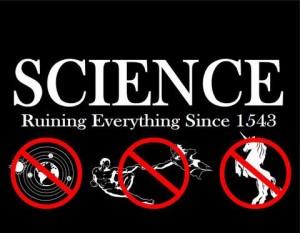
So what do we do when faced by dogmatic beliefs about demonstrably wrong ideas about the world as it is? Clearly, debating and arguing with true believers is pointless, since no evidence changes their minds, and in most cases it will backfire. But as I discovered when my 2007 book Evolution: What the Fossils Say and Why it Matters came out, most Americans are in the middle, not sure what to believe. They’ve heard a bit about evolution and were probably raised in a religious household, but are not completely committed to either. Judging from the emails I got, and the majority of reviews on its Amazon.com site, my book was particularly effective in reaching these fence-sitters, and I was enthralled about how many people it helped. In addition, scientists and advocates of reality-based world views need to avoid party labels and off-putting partisanship, but frame the issues (like evolution, vaccination, climate change) in terms of the economic benefits, or importance to human survival. And echoing Phil Plait on the TAM podium two years ago (who was quoting Wil Wheaton), “Don’t be a dick.” There’s no reason to condescend or belittle people who disagree with you, when patient persuasion works much better.
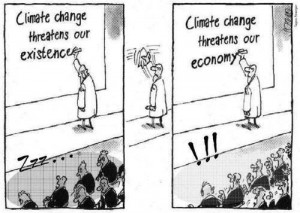
I concluded with a few bits of hopeful news. Although the battles with creationists seem never-ending, the latest polls show that creationism is actually losing ground in this country (despite the misleading numbers of the Gallup Poll). Especially among the younger generation (Millennials in particular) there has been a huge backlash against right-wing hate that led to anti-woman, anti-gay, anti-minority, and anti-science policies that some state governments have implemented when the right wingers took power. These young people are not only put off by these people and their policies, but by religion in general, so that the fastest-growing category is “No religion”, which represents over 45% of the young generation. More careful polls show that creationists are at best a small minority: only 14% of Americans believe in a 6000-year-old earth; up to 60% accept evolution except for humans; up to 80% accept plate tectonics despite the efforts of young-earth creationists. I pointed to the example of the northern European countries, which have a strong social safety net, and one of the lowest rates of religiosity in the world. In fact, this transformation can happen very fast. In the 1960s, a new progressive government took over Catholic-ruled Quebec, and it went from the most backward and ignorant and religious of all the Canadian provinces to the most progressive and non-religious in one generation. I doubt the U.S. can change that quickly, but if current trends hold, in a few more election cycles the younger generation, the women, and the minorities will hold the balance of power, and there will no longer be any electoral power from the fundamentalists and the science deniers.
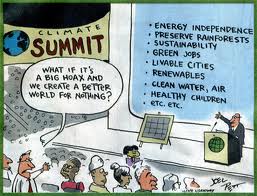
The same can be said for climate deniers: most recent polls show that 60-80% or more of Americans (including a majority of Republicans even!) accept that humans are changing climate and that we need to do something about it. The actual number of true climate deniers is at best 10-20% of the population, although they hold thrall over the entire GOP leadership. But the U.S. is one of the last developed nations on earth where the anti-science of climate denial is still a political problem. As in the case of fundamentalism, the younger generation is massively in favor of strong measures to mitigate climate change, since they inherited the mess we older folks left behind. Once they really exercise their clout in a few more electoral cycles, climate denial will no longer stalemate U.S. politics, and we will move forward. Sadly, U.S. policy has been at a standstill due to political stalemate, while the rest of the world has already moved ahead on climate policy. They are eating our lunch economically with their forward-looking green policies and decreasing carbon footprint, and many of them are also pioneering the technology of the future that we don’t yet have the foresight to support. I concluded with a cartoon shown at the bottom of this post, which got a big laugh, and a quote from Carl Sagan, “It is better to grasp the universe as it really is than to persist in delusion, however satisfying and reassuring.”

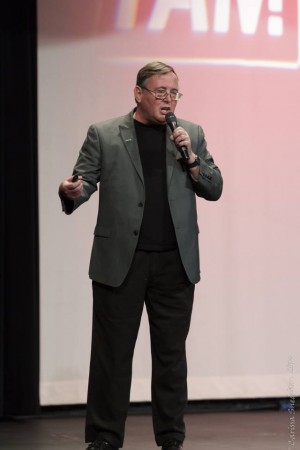
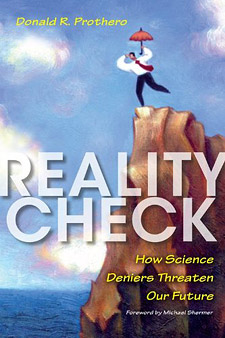

Penn Jillette is one of those sinister “Climate Deniers” an dyet you happily ate his doughnuts and bacon. I guess ideological purity takes a back seat to hobnobbing with celebrities.
FYI, I do not attend Jilette’s party at TAM, so I never ate any of his donuts or bacon. And the TAM meeting is a big tent: we have secular libertarians like Penn as well as religious skeptics and scientists and others. There’s no requirement that we all agree with one another at TAM on every issue, as long as we are in agreement about bigger issues, like fighting “woo” and promoting skepticism.
You can also disagree with friends, attend their parties and eat their donuts. There is no requirement that that you agree with your friends, or family, or anyone. I have plenty of highly religious and right wing friends with whom I have lively debates regarding all of our beliefs. In the end, we are still friends.
Trimegistus,you often reveal your own faults with your comments,rather than your intended attempts to expose them in others.
A bit of self reflection before you hit ‘submit comment’ could serve you well.
You might check this entry on RationalWiki:
http://rationalwiki.org/wiki/Penn_%26_Teller#More_on_anthropogenic_global_warming
Also recently on his podcast, Penn’s Sunday School, Penn said that there were a number of issues that he wished he and Teller could re-address that were covered on their “BS” program for which they have gotten further information. I do not recall if Penn explicitly said that climate change (or the desirablity for government intervention to work against it which would be more along his libertarian lines) would be on or off this list of re-examined issues.
“Penn Jillette is one of those sinister ‘Climate Deniers’ and yet you happily ate his doughnuts and bacon. I guess ideological purity takes a back seat to hobnobbing with celebrities.”
Maybe it takes a back seat to doughnuts and bacon.
You’re more optimistic than I am about the timetable for pushing science-deniers out of office; they have a LOT of money behind them, and money drives politics in the U.S. far more than it does in Europe. At the same time, the optimism of some can keep the rest of us going.
I do hope we can see a change in our path. I have nieces and nephews that are still kids, I would like to think that they will not have to wear breathers and live in climate controlled environments, eating soy and insects. Your poll numbers leave me with hope, but that hope is usually dashed when I see stories about allowing deep sea drilling off our eastern seaboard…
I wish I shared your views on climate change Don. As a resident of the first country to repeal their Carbon Tax I’m less than totally positive right now. Hopefully as you say, the next generation can start playing an active role sooner rather than later.
I think the Abbott Govt is a last kick of the dying type of right winger that is inextricably linked to Howard and even the late Bruce Ruxton….Turnbull would have been an entirely different PM, and of course Australia voted for change….for pretty much no reason….
And those things change quickly in Australia, as they do in any parliamentary system. The next cycle will probably bring Gilliard back and the Tories will be out. Likewise, Canada looks like to drop its Tory regime in the next election if their two left of center parties can work things out.
In the US, the GOP has just about completely ruined its chances of ever winning another presidential election with their swing to the hard right–especially if a popular candidate like Hilary is the Dem nominee in 2016. And when the 2020 census happens, it’s likely that the Dems will have even more control over statehouses (since the 2020 election will have a high Dem turnout since it is a presidential year, unlike 2010), and they will be able to undo the GOP gerrymandering of the fluke year of the 2010 and the Teabaggers…
That they do, but the real and rather sad reason that Abbot was elected is not so much a desire for change, but the perception (right or wrong) that both Rudd and Gillard were ineffective as leaders.
In my own opinion Rudd seemed to ‘loose the plot’ once he got to the end of his list of election promises. As for Gillard she reminded me too much of a woman called Robin Greenberg, the person who proved that women are just as good at high-powered commercial fraud as men. Especially when she reached into Greenbergs playbook and blamed her failures on sexism.
Abbot while a jerk, at least seemed to be a consistent jerk, and it was consistancy that the voters reached for.
Hopefully Shorten will prove to be worthy of Hawke, Keating & Howard and at least give the impression he is worthy of the top job.
If only Beazley had been elected back in the 1990’s…
You’d surely worry a little about Gillard’s honesty, with her recently commenting that, “… We fought very hard to bring in a carbon tax…” (implied here: for the good of the people), when in fact she was forced to do so by a handful of greens who held the balance of power. It was a deal made simply to ensure she could govern.